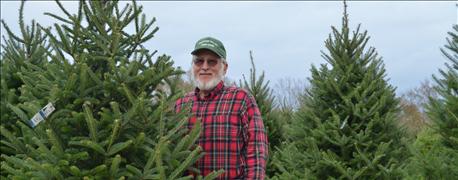
It can take from three to seven years for Christmas tree farmers to reap the fruits of their labor. When Vern and Bee Spaunhorst started their Christmas tree farm in 1983, they planted 2,000 Scotch pine. From that initial crop, the couple only sold 300.
"The next year it was 600," Vern recalls. "I knew there had to be a better way."
After reading an article in Christmas Tree Grower’s magazine of a "new" fir tree that grew well on a farm in Indiana, Vern knew he had to try the Canaan fir.
Problem with pine

THE LAND OF CANAAN: Canaan firs from West Virginia are working for Missouri tree farms offering a local fir for Christmas. Vern Spaunhorst started growing the trees in the early1990s.
Scotch pine thrives in the hills of Missouri. Vern found that the tree likes clay soils, tolerate both hot and cold temperatures, handle the state's dry weather and grow to 8 feet in roughly 8 years.
"But we had difficulty with insect and diseases," he explains. He began spending more money trying to solve the problems than what the trees were worth. In addition, there was a surplus of Scotch pine trees driving down prices. The farm the couple created was on the verge of closing.
After 12 years of planting Scotch pine, the Spaunhorsts decided to stop.
Fixing it with fir
Many look forward to the aroma of fir tree around Christmas, especially those that grew up in the 1950s. Back then, Vern recalls it was a balsam or Douglas fir that anchored in the corn of living rooms across the country. The couple longed to bring that experience back to the Midwest.
However, firs do not grow well in a Midwestern climate-or so he thought. It wasn't until reading about a farm in Indiana growing special fir tree that the Franklin County farmer thought perhaps it could work in Missouri.

Vern and Bee Spaunhorst
The Canaan fir is a tree native in West Virginia and Virginia. It gets its name from the Canaan Valley in northeast Elkins, West Virginia. This fir tree is similar to both Fraser and balsam, according to Vern, but is a variety of balsam fir.
"It has that same aroma and is soft to the touch," he notes. The limbs are strong and open allowing ornaments to hang. The needles are round, giving it a soft, non-prickly feel.
Vern planted the fir in an area of the farm with lighter soils and good drainage. And the trees began to thrive.
The tree has become a favorite of the family to grow and customers to purchase. "We sell out of all the Canaan fir trees available to cut down every year," he notes.
About the Author(s)
You May Also Like






